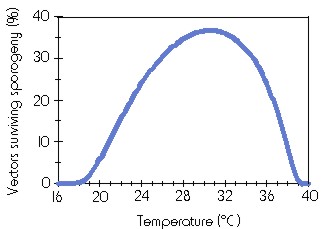The time it takes from egg to adult varies according to the temperature, but it is usually about 10-14 days in tropical countries.
Adult mosquitoes usually mate a few days after emerging from the pupae. The male mosquitoes form large swarms and the females fly into these in order to mate.
It is only the females who take blood meals. Male mosquitoes feed on sugar and so get this from nectar and any other readily available sources of sugar. Females also feed on sugar, but they need the protein from the blood in order to develop the eggs.
After feeding, egg development takes about 2-3 days and the female rests and doesn't feed during this time. After the eggs are laid the cycle starts again and the female mates and seeks another blood meal.

Source: MARA
The length of time a mosquito lives for is dependent on temperature. For male mosquitoes it is usually a week, and for females usually up to 2 weeks.
The graph on the left shows the percentage of mosquitoes who survive for a day or more depending on temperature.
This is very important for malaria rates as if the female mosquito doesn't live long enough for the sporogonic cycle to occur (the development of the parasite within the mosquito) then malaria won't be transmitted.
As the length of the sporogonic cycle depends on temperature too, there is a very delicate temperature balance between mosquito survival, sporogonic cycle length and malaria transmission.

Source: MARA
This relationship is shown in the graph on the left. It shows the percentage of mosquitoes which survive through the whole sporogonic cycle depending on temperature.
If the temperature isn't right, either the parasite won't develop or the mosquito will die before the sporogonic cycle has completed and she has taken another meal and so malaria will not spread.
Understanding this relationship is important for prediciting transmission and is discussed more in the modelling pages.